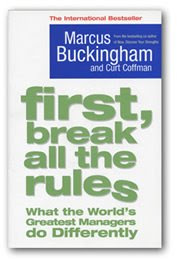First break all the rules - Marcus Buckingham and Curt Coffman

This book is built around a fundamental idea - that each individual has his own talent (defined as a recurring pattern of thought, feeling or behavior that can be productively applied) and talents cannot be changed. This is the basis for breaking all the rules supported by conventional wisdom with regards to managing people, e.g. that we should keep working on people's weaknesses, that we promote perfomers regardless whether the person's talents are suited for the job, that given enough practice, most people can do most jobs well.
Some other takeaways!
- The role of a manager to is to spot and fully harness the talents of each employee. To do this, one must recognise the difference btw talent, skills and knowledge. The last two can be taught. The former, it will have to be selected, and the employee will also have to be casted in the right role.
- There are three main dimensions of talent - striving (what motivates the employee), thinking (how he thinks, strategise and process information) and relating (how does he deal with people, praises, etc).
- Management by exception - manage each individual differently, according to their talents, and spend the most of yr time with your top performers. This is a natural step following from the understanding that the manager's role is to cultivate strength, rather than focus on weaknesses.
- Tough love = uncompromising focus on excellence and genuine care for employees. Balancing the two well is the key to successful management.
The rest of the book contains many insightful steps and details relating to these issues. This will likely be the last management book that I'm picking up for now - will start diversifying into other areas :)
Labels: Readings





